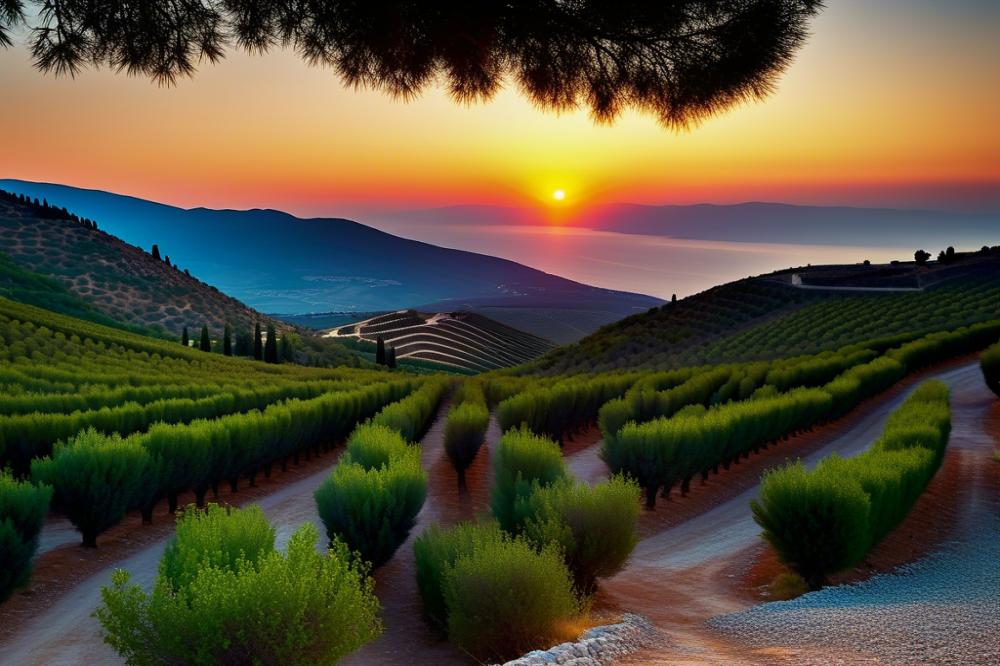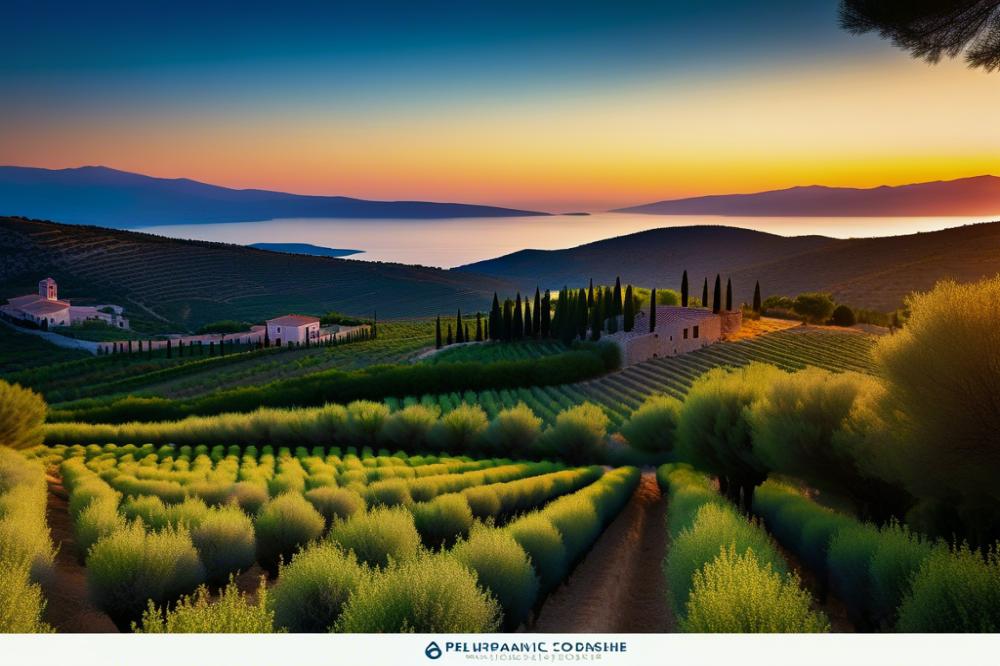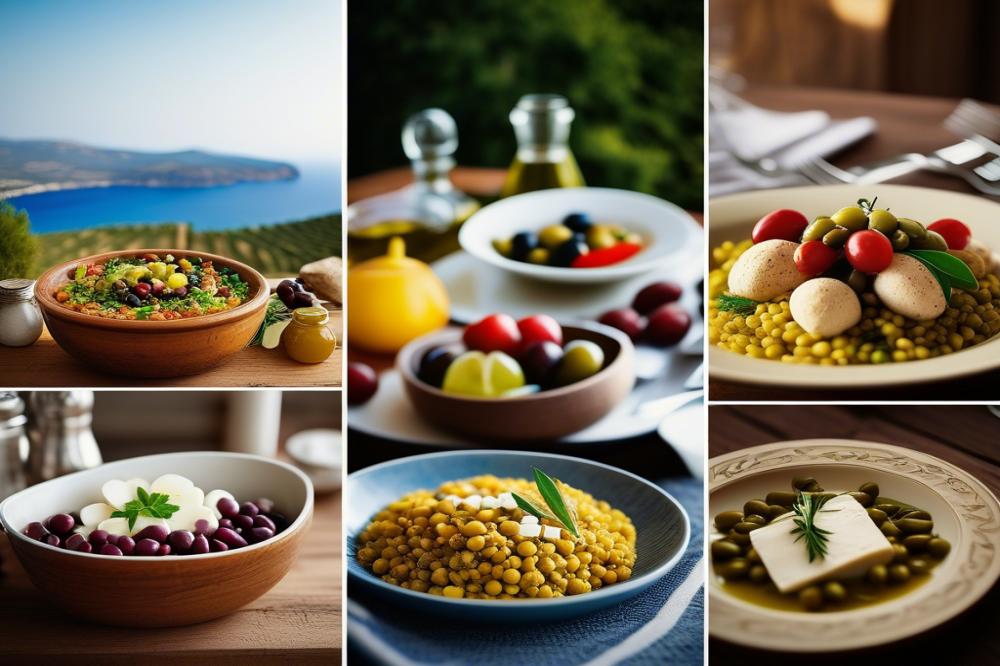A Gastronomic Journey Through the Peloponnese Region
The Peloponnese region is a true culinary treasure of Greece. Known for its rich and diverse history, this area offers a vibrant tapestry of flavors. Its cuisine acts as a lens through which one can explore Greek culinary heritage. Each dish tells a story, connecting the past with the present in delightful ways. Visitors to this region often find themselves enchanted by the variety of local ingredients that shape its distinct tastes.
Olive oil plays a central role in many dishes, serving as a staple across the Mediterranean diet. This liquid gold, combined with fresh vegetables and herbs, elevates traditional recipes to new heights. The flavors of ripe tomatoes, pungent garlic, and aromatic oregano are just a few examples of what makes Peloponnese cuisine so captivating. Aside from olive oil, the region is also famous for its excellent wine production. The vineyards flourish thanks to the fertile soil and warm climate, creating a perfect backdrop for exquisite wines.
Food festivals celebrate the culinary heritage of the Peloponnese. Visitors can immerse themselves in festivities that showcase regional specialties. Attending these events provides a chance to sample various dishes, from hearty stews to sweet pastries. Each bite highlights the care and tradition behind the food. The farm-to-table movement thrives here. It reflects the commitment to using fresh, seasonal products for the utmost quality.
Witnessing the blending of flavors in Peloponnese dishes is nothing short of a sensory adventure. Greek food offers a multitude of textures and aromas that linger on the palate. Diners can savor meals infused with spices reminiscent of centuries-old cooking techniques. Whether it’s grilled meats, stewed legumes, or flaky pastries, every meal is a journey unto itself. The Peloponnese invites all to experience the joy of its incredible gastronomy.
Peloponnese cuisine

The essence of Peloponnese cuisine lies in its deep connection to the land and its cultural traditions. This region boasts a rich culinary heritage shaped over centuries. The Mediterranean diet plays a crucial role in local cooking, emphasizing fresh produce, grains, and healthy fats. Fresh fruits and vegetables feature prominently in many dishes, showcasing the bounty of the region.
Local ingredients are the heart and soul of this gastronomy. Farmers grow olives that produce high-quality olive oil, a staple in almost every meal. In many families, traditional recipes are passed down through generations, with techniques and flavors often remaining unchanged. These recipes often tell stories of time-honored practices, connecting generations.
Balance of flavors defines many meals. The use of herbs and spices enhances dishes, creating vibrant tastes without overwhelming the palate. Local seafood, meats, and dairy products are notable examples of regional specialties that capture the essence of this area. Many people also participate in food festivals, celebrating seasonal harvests and local delicacies.
Wine production complements the culinary offerings of Peloponnese. Vineyards thrive in this warm climate, contributing to the cultural experience tied to meal times. Guests can enjoy a glass of robust red wine or crisp white, elevating their dining experience. The farm-to-table movement also resonates here, as communities strive to source ingredients locally. This philosophy supports small farmers and showcases the incredible diversity of flavors found within the Peloponnese.
Local Ingredients

The Peloponnese region is rich in local ingredients that bring its cuisine to life. Olive oil stands out as a staple in many dishes. This golden liquid is not just for cooking; it adds flavor and health benefits to the Mediterranean diet. Many families in the area produce their own oil. Visitors will find varying tastes based on the olives used.
Olives are another important product here. You can enjoy them as a snack or in salads. These small fruits come in different varieties, each offering a unique taste. Nuts also play a role in this gastronomy. Almonds and walnuts are common ingredients in desserts or as toppings.
Seasonal and locally sourced ingredients shape traditional recipes. Fresh vegetables and fruits from local farmers’ markets find their way into many meals. Herbs like oregano, thyme, and rosemary thrive in the Mediterranean climate. Using these fresh herbs enhances flavors and connects dishes to the land they come from.
Seafood is abundant along the coasts. Fishers bring in their daily catches, ensuring freshness on every plate. Dishes like grilled octopus or fried sardines celebrate the bounty of the sea. Food festivals across the region showcase these regional specialties, allowing guests to taste a variety of local dishes.
Wine production is another vital aspect of local culture. Grapes flourish in the sun-drenched hills. Wineries often invite tourists to sample their wines alongside traditional foods. This connection between wine and food adds depth to the culinary heritage of the area.
A commitment to farm-to-table practices shines through in many restaurants. Chefs prioritize ingredients from nearby farms and markets. This focus on freshness contributes to the distinct flavors of Peloponnese cuisine. Each meal tells a story of the land, the sea, and the people who craft it.
Wine Production

The Peloponnese region has a rich history of wine production that stretches back thousands of years. Ancient Greeks revered wine, and this area was once home to numerous vineyards. Today, it continues to be an essential part of local culture and traditions.
Several regional vineyards contribute to the diverse wine landscape of the Peloponnese. The region is especially known for its unique grape varieties, including Agiorgitiko and Moschofilero. Agiorgitiko offers a deep, rich red wine with fruity notes, while Moschofilero presents a crisp, aromatic white. Both are integral to local gastronomy.
Throughout history, winemaking practices have transformed but always retained a connection to the land. Many wineries emphasize sustainable methods, showcasing farm-to-table principles. Visiting these vineyards provides an opportunity to taste wines paired with local ingredients, enhancing their flavors.
Food pairings play a vital role in enjoying these wines. Traditional recipes often use olive oil, fresh vegetables, and assorted meats that complement the wines perfectly. A spicy Moussaka paired with a glass of Agiorgitiko can elevate the entire meal. Similarly, Moschofilero is a delightful match for seafood dishes like grilled octopus.
Throughout the year, the Peloponnese hosts vibrant food festivals that celebrate both wine and local cuisine. At these festivals, visitors can engage with winemakers and chefs, sampling regional specialties. The Mediterranean diet is emphasized, focusing on health and flavor drawn from the earth.
The connection between wine and food in the Peloponnese is intertwined with its culinary heritage. Many families have passed down their recipes through generations, blending traditional flavors with modern techniques. Each meal is an experience that tells a story through taste.
Culinary Adventures and Experiences

The Peloponnese region offers numerous culinary adventures that captivate the senses. Visitors can immerse themselves in farm-to-table experiences, where they can savor dishes made with fresh local ingredients. Joining a cooking class is another exciting option. In these sessions, travelers can learn traditional recipes from skilled locals. They might discover the secret behind a perfect moussaka or how to prepare authentic dolmades.
Food tours provide an excellent way to explore the culinary landscape. These guided excursions take participants through bustling markets and charming villages. Travelers can taste regional specialties like freshly caught seafood or rich, earthy cheeses. Engaging with local chefs and producers offers deeper insights into the area’s culinary heritage. Knowledgeable locals share stories about their craft while showcasing the role of olive oil and spices.
Wine production is also a highlight. Visitors can tour vineyards and sample exquisite wines in picturesque settings. This experience marries beautifully with the Mediterranean diet, emphasizing the relationship between food and drink. Additionally, food festivals celebrate the richness of the region’s gastronomy. During these lively events, guests can indulge in traditional dishes while enjoying music and dance.
For a hands-on culinary experience, participants can join an olive oil tasting. Learning about the different types and their uses can transform how one views this essential ingredient. Each taste reveals the dedication behind its production. Exploring the Peloponnese through its flavors offers a unique journey, filled with unforgettable dishes and experiences.
Food Festivals and Regional Specialties
The Peloponnese region is alive with flavors, celebrating its rich culinary heritage through various food festivals. Each event showcases local ingredients and traditional recipes that have been passed down through generations. Visiting these festivals offers a unique opportunity to experience the heart of Peloponnese cuisine.
One of the most notable events is the Olive Oil Festival, held in several towns across the region. Here, visitors can learn about the process of olive oil production while tasting some of the finest oils produced in Greece. Different varieties, each with unique characteristics, delight the palate. The festival also features workshops, where attendees can understand the importance of this ingredient in the Mediterranean diet.
The wine fairs are equally captivating. Vineyards in Peloponnese produce some of the best wines in Greece. Events often include vineyard tours, where people can see the grapes on the vine and learn about the different types of wine production. Tasting sessions allow guests to savor local wines while pairing them with regional cheeses and cured meats.
Several popular dishes reflect the region’s flavors. Moussaka, with its layers of eggplant and ground meat, is a favorite. Another standout is souvlaki, skewers of tender meat, often served with pita bread and fresh vegetables. These dishes often feature ingredients sourced from nearby farms, emphasizing the farm-to-table philosophy embraced by many chefs.
In addition, festivals celebrating citrus fruits add a vibrant twist to culinary offerings. These events showcase how lemons and oranges enhance local dishes and desserts. Visitors can indulge in sweets made from these fruits, such as baklava drizzled with honey and sprinkled with zest.
Each food festival is a celebration of community and tradition. Locals come together to share stories, recipes, and laughter, fostering a connection to the land and its bountiful offerings. The experience not only fills the stomach but also warms the heart, making it an essential part of any journey through the Peloponnese.
Finding joy in food is at the core of life in this region. Those who attend these festivals leave with a deeper appreciation for the culinary artistry and the rich history behind every dish. The Peloponnese is truly a land of gastronomic delight, waiting for all to explore.
A Culinary Adventure Awaits
The Peloponnese region offers a truly rich gastronomic experience. Food lovers are in for a treat as they explore a landscape filled with diverse flavors and traditions. Local ingredients play a key role in the dishes that define this area. From fresh vegetables to caught seafood, each component adds depth to every meal.
Traditional recipes are often passed down through generations. Families preserve these secrets, ensuring that every bite carries a story. The culinary heritage here is not just about eating; it’s about connecting with the land and its people. Markets brim with vibrant produce and artisanal products waiting to be discovered.
Visitors should take the time to enjoy local tavernas that serve authentic meals. Each dish is crafted with care, showcasing the region’s unique taste. Pairing flavorful foods with local wines elevates the experience even further.
An adventure through the Peloponnese is not complete without tasting its exquisite offerings. Engage with local chefs, learn about their methods, and savor the aromas that fill the air. These moments create memories that last and deepen the appreciation for this area’s gastronomy.
So, venture forth and explore the flavors that the Peloponnese cuisine has to offer. Allow your senses to guide you through the charm and richness of this remarkable region. Savor the warmth of its people and the richness of its food, ensuring you cherish each delightful moment along the way.



